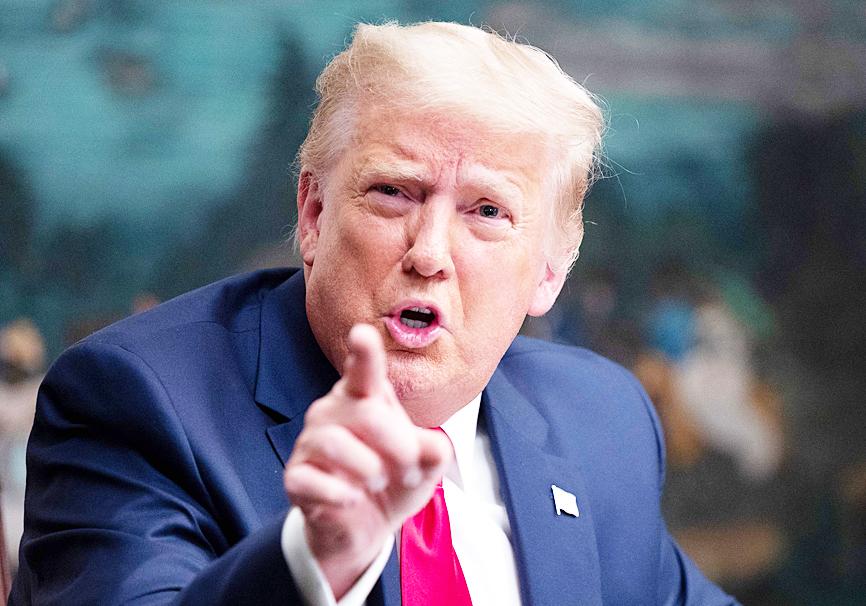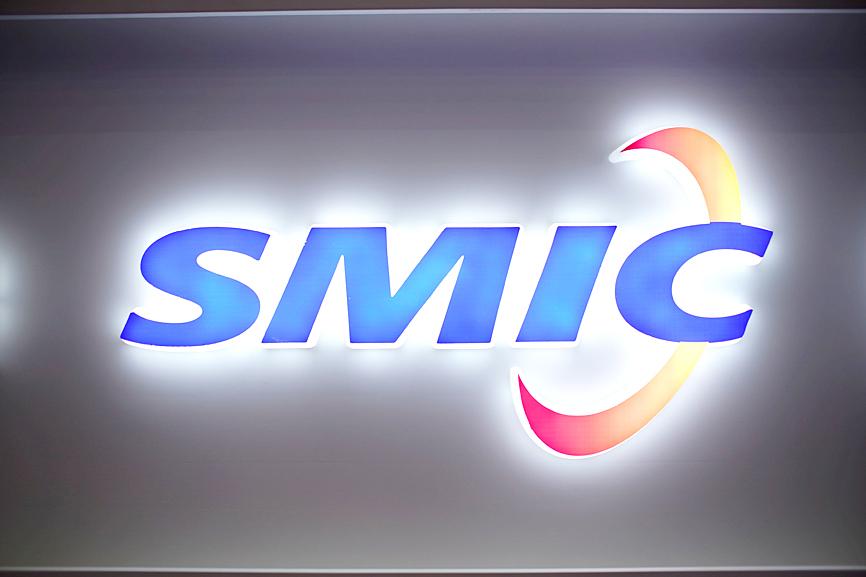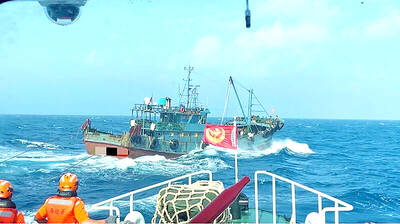US President Donald Trump’s administration is poised to add China’s top chipmaker, Semiconductor Manufacturing International Corp (SMIC, 中芯國際), and national offshore oil and gas producer China National Offshore Oil Corp (CNOOC, 中國海洋石油) to a blacklist of alleged Chinese military companies, according to a document and sources, curbing their access to US investors and escalating tensions with Beijing weeks before president-elect Joe Biden takes office.
Reuters last month reported that the US Department of Defense (DOD) was planning to designate four more Chinese companies as owned or controlled by the Chinese military to the list, bringing the number of Chinese companies affected to 35.
A recent executive order issued by Trump would prevent US investors from buying securities of the listed firms starting late next year.

Photo: AFP
It was not immediately clear when the new tranche, would be published in the Federal Register, but the list comprises China Construction Technology Co (中國建築技術公司) and China International Engineering Consulting Corp (中國國際工程諮詢公司), in addition to SMIC and CNOOC, according to the document and three sources.
SMIC said it continued “to engage constructively and openly with the US government” and that its products and services were solely for civilian and commercial use.
“The company has no relationship with the Chinese military and does not manufacture for any military end-users or end-uses,” it said.

Photo: Reuters
CNOOC’s listed unit said in a stock market statement that it had inquired with its parent and learned that it had not received any formal notice from US authorities.
Chinese Ministry of Foreign Affairs spokeswoman Hua Chunying (華春瑩) said, in response to a question about Washington’s planned move, that China hoped the US would not erect barriers and obstacles to cooperation and discriminate against Chinese companies.
The upcoming move, coupled with similar policies, is seen as seeking to cement Trump’s tough-on-China legacy and to box Biden into hardline positions on Beijing amid bipartisan anti-China sentiment in Congress.
The Biden campaign declined to comment.
Reuters reported last week that the Trump administration is close to declaring that 89 Chinese aerospace firms and other companies have military ties, restricting them from buying a range of US goods and technology.
The list of “Communist Chinese Military Companies” was mandated by a 1999 law requiring the Pentagon to compile a catalog of companies “owned or controlled” by China’s People’s Liberation Army, but DOD only complied this year.
HONG KONG
Meanwhile, Hua said that China would impose sanctions on four people with links to US democracy promotion efforts over interference in Hong Kong: John Knaus, senior director of the National Endowment for Democracy; Manpreet Anand, a regional director of the National Democratic Institute (NDI); Kelvin Sit, the NDI’s program director for Hong Kong; and Crystal Rosario, a specialist at the NDI.
As of yesterday, the four were banned from entering China, she said.
“The US behavior blatantly interferes in Hong Kong affairs and grossly interferes in China’s domestic affairs,” Hua said. “It violates basic norms governing international relations, and China firmly rejects and condemns this.”

MILITARY BOOST: The procurement was planned after Washington recommended that Taiwan increase its stock of air defense missiles, a defense official said yesterday Taiwan is planning to order an additional four PAC-3 MSE systems and up to 500 missiles in response to an increasing number of missile sites on China’s east coast, a defense official said yesterday. The official, who spoke on condition of anonymity, said that the proposed order would be placed using the defense procurement special budget, adding that about NT$1 trillion (US$32,88 billion) has been allocated for the budget. The proposed acquisition would include launchers, missiles, and a lower tier air and missile defense radar system, they said The procurement was planned after the US military recommended that Taiwan increase

POLITICAL AGENDA: Beijing’s cross-strait Mid-Autumn Festival events are part of a ‘cultural united front’ aimed at promoting unification with Taiwan, academics said Local authorities in China have been inviting Taiwanese to participate in cross-strait Mid-Autumn Festival celebrations centered around ideals of “family and nation,” a move Taiwanese academics said politicizes the holiday to promote the idea of “one family” across the Taiwan Strait. Sources said that China’s Fujian Provincial Government is organizing about 20 cross-strait-themed events in cities including Quanzhou, Nanping, Sanming and Zhangzhou. In Zhangzhou, a festival scheduled for Wednesday is to showcase Minnan-language songs and budaixi (布袋戲) glove puppetry to highlight cultural similarities between Taiwan and the region. Elsewhere, Jiangsu Province is hosting more than 10 similar celebrations in Taizhou, Changzhou, Suzhou,

COGNITIVE WARFARE: Chinese fishing boats transmitting fake identification signals are meant to test Taiwan’s responses to different kinds of perceived incursions, a report said Chinese vessels are transmitting fake signals in Taiwan’s waters as a form of cognitive warfare, testing Taipei’s responses to various types of incursions, a report by the Institute for the Study of War said on Friday. Several Chinese fishing vessels transmitted fake automatic identification system (AIS) signals in Taiwan’s waters last month, with one mimicking a Russian warship and another impersonating a Chinese law enforcement vessel, the report said. Citing data from Starboard Maritime Intelligence, the report said that throughout August and last month, the Chinese fishing boat Minshiyu 06718 (閩獅漁06718) sailed through the Taiwan Strait while intermittently transmitting its own AIS

CHINESE INFILTRATION: Medical logistics is a lifeline during wartime and the reported CCP links of a major logistics company present a national security threat, an expert said The government would bolster its security check system to prevent China from infiltrating the nation’s medical cold chain, a national security official said yesterday. The official, who wished to stay anonymous, made the remarks after the Chinese-language magazine Mirror Media (鏡周刊) reported that Pharma Logistics (嘉里醫藥物流) is in charge of the medical logistics of about half of the nation’s major hospitals, including National Taiwan University Hospital and Taipei Veterans General Hospital. The company’s parent, Kerry TJ Logistics Co (嘉里大榮物流), is associated with the National Committee of the Chinese People’s Political Consultative Conference (CPPCC) and the Chinese People’s Liberation Army (PLA), the